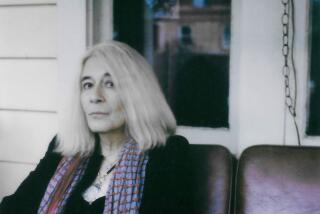COMMITMENTS : A Voice That Saved Her Life : Books: Iyanla Vanzant well remembers the moment she knew she had to leave her abusive husband. Now she wants to help other women escape too.
- Share via
It was 2 a.m. when she returned from bowling, a rare respite from her husband’s reign of terror. She slipped into bed, thinking he was not at home. As she drifted off to sleep, he sprang from the closet--all 6 feet, 4 inches and 240 pounds of him--and turned the bed over with her still in it.
“I was under the mattress, the box spring,” Iyanla Vanzant recalls. Her enraged husband shattered the bed and smashed her on the head with a wooden slat. “He opened my skull. There was so much blood.”
That attack was just the latest episode in a lifetime of abuse that had begun when she was a child . . . the unspeakable terror implanted when an uncle began sexually abusing her when she was 11.
A week later, with stitches still in her head, Vanzant bolted awake in the middle of the night.
“I thought it was my husband,” she says. The voice was loud enough. But this time it came from within--from some reservoir of strength even she had forgotten was there. “It told me to leave . . . now! If you don’t, he is going to kill you.”
She immediately got out of bed, gathered her three children--ages 3, 5 and 7--stuffed a few clothes in plastic bags and headed out into the Brooklyn night for the subway station.
“I didn’t have time to be afraid or question.”
She was 23 years old.
That night parallels what some religions call a conversion experience--a defining moment that puts the past into perspective and makes clear the promise of the future.
She joined the cresting tide of women on the welfare rolls. But she also enrolled in college, and stayed until she had earned a law degree from City University of New York. She became a public defender in Philadelphia before becoming a best-selling author and motivational speaker.
Her first book, “Tapping the Power Within: A Path to Self-Empowerment for Black Women” was published three years ago by Writers & Readers. Her second, “Acts of Faith: Daily Meditations for People of Color” (Fireside) spent 13 weeks on the Washington Post’s bestseller list.
Her third book, “The Value of the Valley: A Black Woman’s Guide Through Life’s Dilemmas,” was published by Simon & Schuster last month.
Vanzant, 41, calls it a road map for African American women--one she hopes will help them discover the key to unlocking their personal, crippling silences.
“I know the ignorance I have experienced as a black woman,” she says. “I remember how I suffered in silence. And I remember the magnificence of my revelations.”
*
The inner voice that spoke so powerfully to her that night in Brooklyn continues to resonate in her writing. And she wants to share the lessons she has learned:
“I don’t want my sister to cry anymore--to let another lunatic into her life, to work for another employer who disrespects and underpays her, to wear rundown shoes while she tries to take care of her children.”
Vanzant’s guide is forged from her own painful experiences--a valley that once seemed bottomless, a place where she knows countless thousands of women dwell. But there are ways out. And the journey begins within.
“When you begin to love and honor and value yourself, you begin to understand your power,” she says.
Among the 10 valleys she describes is one called “Other People’s Problems,” which black women tend to take on as their own.
USC psychologist Tracy Shaw says African American women are particularly susceptible to trying to please others, remaining trapped in stereotypes.
“It’s the idea of black women seeing themselves as strong, domineering, unable to show their vulnerable side,” says Shaw, who also runs a support group in Culver City. “We think we are not allowed to ask for help, or just say, ‘No, I’m tired. I can’t help you.’ ”
Vanzant wants black women to recognize that they do not have to be superwomen. She reinforces her point with tales from ordinary women who triumphed--over doomed relationships, financial ruin or guilt-ridden workaholism.
An essential part of her approach is emphasizing that those valleys also hold liberation. It comes after confronting fears, learning to trust yourself, examining your contribution to your own pain.
And with liberation comes power. Says Vanzant: “The only thing that separates me from all that power is my mind . . . fear, indoctrination, doubt.”
More to Read
Sign up for our Book Club newsletter
Get the latest news, events and more from the Los Angeles Times Book Club, and help us get L.A. reading and talking.
You may occasionally receive promotional content from the Los Angeles Times.







